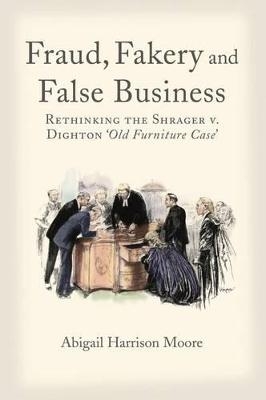
Fraud, Fakery and False Business
Rethinking the Shrager versus Dighton 'Old Furniture Case'
Seiten
2011
Continuum Publishing Corporation (Verlag)
978-1-4411-1575-1 (ISBN)
Continuum Publishing Corporation (Verlag)
978-1-4411-1575-1 (ISBN)
Political, social and racial discrimination in inter-war England explored through one case study of the corrupt antiques market. In 1922, Adolphe Shrager having made his fortune during the First World War, approached the London dealer Basil Dighton for advice on purchasing antique furniture. This title provides details on the Shrager Dighton case.
Political, social and racial discrimination in inter-war England explored through one case study of the corrupt antiques market. In 1922, Adolphe Shrager having made his fortune during the First World War, approached the London dealer Basil Dighton for advice on purchasing antique furniture. Dighton sold him about five hundred items but shortly afterwards Shrager discovered that one of his 'collector's pieces' was judged to be a fake and grossly over-priced, and he sued. The trial, held in early 1923, became a cause celebre, but it can be viewed as a case study of a much wider set of social and cultural concerns: the fact that Shrager lost both the first trial and the appeal, despite demonstrating on numerous occasions that he had a clear case against Dighton, raises questions of race, prejudice and class, where the establishment closed ranks against Shrager, the nouveau riche Jew and alleged war profiteer. This book - the first on the Shrager Dighton case - is the result of the author's original archival research.
Political, social and racial discrimination in inter-war England explored through one case study of the corrupt antiques market. In 1922, Adolphe Shrager having made his fortune during the First World War, approached the London dealer Basil Dighton for advice on purchasing antique furniture. Dighton sold him about five hundred items but shortly afterwards Shrager discovered that one of his 'collector's pieces' was judged to be a fake and grossly over-priced, and he sued. The trial, held in early 1923, became a cause celebre, but it can be viewed as a case study of a much wider set of social and cultural concerns: the fact that Shrager lost both the first trial and the appeal, despite demonstrating on numerous occasions that he had a clear case against Dighton, raises questions of race, prejudice and class, where the establishment closed ranks against Shrager, the nouveau riche Jew and alleged war profiteer. This book - the first on the Shrager Dighton case - is the result of the author's original archival research.
Abigail Harrison Moore is the Deputy Head of the School of Fine Art, History of Art and Cultural Studies at the University of Leeds, where she is also programme director for the MA in Art Gallery and Museum Studies.
Prologue; 1. The Emperor's New Clothes; 2. Dighton and Co; 3. Percy MacQuoid and the Role of the 'Expert'; 4. Shrager's Collection; 5. The Verdict.
| Erscheint lt. Verlag | 10.11.2011 |
|---|---|
| Zusatzinfo | 6 illus |
| Verlagsort | New York |
| Sprache | englisch |
| Maße | 156 x 234 mm |
| Themenwelt | Kunst / Musik / Theater ► Allgemeines / Lexika |
| Geschichte ► Allgemeine Geschichte ► Neuzeit (bis 1918) | |
| Geschichte ► Allgemeine Geschichte ► 1918 bis 1945 | |
| Geisteswissenschaften ► Geschichte ► Regional- / Ländergeschichte | |
| Geschichte ► Teilgebiete der Geschichte ► Kulturgeschichte | |
| Recht / Steuern ► EU / Internationales Recht | |
| ISBN-10 | 1-4411-1575-7 / 1441115757 |
| ISBN-13 | 978-1-4411-1575-1 / 9781441115751 |
| Zustand | Neuware |
| Haben Sie eine Frage zum Produkt? |
Mehr entdecken
aus dem Bereich
aus dem Bereich
Europa 1848/49 und der Kampf für eine neue Welt
Buch | Hardcover (2023)
DVA (Verlag)
CHF 67,20
Giordano Bruno - ein ketzerisches Leben
Buch | Hardcover (2024)
C.H.Beck (Verlag)
CHF 41,85


